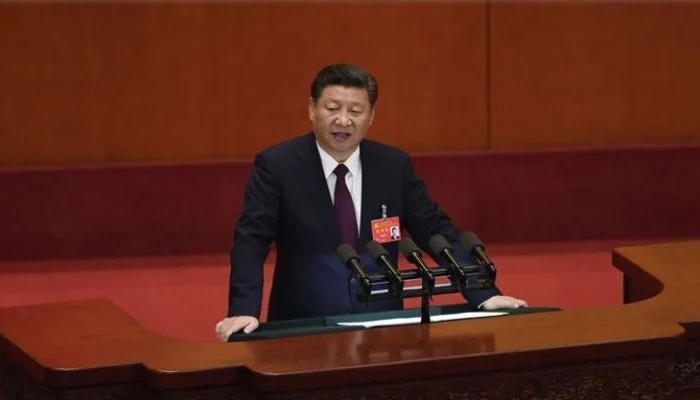China tightens Xi Jinping’s powers against the West

China is adding to Xi Jinping’s vast powers with a new law that will assert Beijing’s interests on the world stage.
A provision of the law threatens to penalize entities that act in a way that is “detrimental” to China’s interests but does not specify which lines should not be crossed.
The law underscores China’s aggressive diplomacy, but how actively it will be enforced after it takes effect on 1 July is unclear.
After Covid, China has been eager to court foreign investment.
According to Jacques deLisle, a law and political science professor at the University of Pennsylvania, the law represents an assertive foreign policy and stronger pushback against the US.
The Global Times called the law a “key step towards enriching the legal toolbox against Western hegemony”.
Despite offering cooperation and economic gains, non-resident scholar Chong Ja-Ian said it was a “signal” that Beijing is willing to use more coercion and pressure to pursue its interests.
Manoj Kewalramani, Director of the Takshashila Institution’s China Studies Programme, said that Chinese leaders tread an “inherent tension” between economic development and national security.
There is likely to be more push-pull in the coming months, he predicted.
There have been strained relations between Beijing and Washington in recent years, with the two superpowers exchanging tit-for-tat trade sanctions.
There have been a series of actions taken this year against Western firms, including raids and the closure of local offices of several US-headquartered consulting firms.
Trade and technology restrictions from the US have led to these actions being viewed as retaliatory measures.
Earlier this month, it banned products made by Micron, a US memory chip giant.
China’s new foreign relations law may result in more international compliance with its interests, but other governments may push back.
Foreign businesses may wish to reconsider their exposure to the Chinese market or public positions they take, including political positions.
This legislation provides more legal support for raids and investigations of foreign firms that have already taken place.
This law, however, does not guarantee that China will take stronger measures.
Several US business leaders, including Elon Musk and Jamie Dimon of JPMorgan Chase, have visited China in recent weeks to emphasize the importance of China to the US economy.
One of the most striking aspects of China’s foreign relations is how the law defines them based on ideology.
A law states, “The People’s Republic of China conducts foreign relations to uphold socialism with Chinese characteristics, safeguard its sovereignty, unification, and territorial integrity, and promote its economic and social development.”
Chinese foreign policy is guided by the political ideologies of Xi Jinping, Mao Zedong, Deng Xiaoping and Marxism-Leninism, among others.
As part of Mr Xi’s tightening grip on power, the law places in writing for the first time that foreign policy is governed by the Communist Party instead of the state.
The law emphasizes party leadership over foreign relations, underlining the Xi era trend of power migration – from the state to the party, and within the party, to Xi,” said Dr deLisle.
The People’s Daily editorial published on Thursday called it “an important measure to strengthen the Communist Party Central Committee’s centralized and unified leadership over foreign affairs.”
However, Mr Kewalramani believes the new law could stifle debate and disagreement on foreign policy matters.
The overall implications can only be understood in time, depending on how the courts interpret the legislation and the punitive costs that are imposed, he added.
